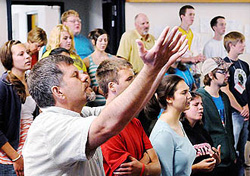In an amphitheater by a placid lake on the Westminster College campus, nearly 2,000 people were at prayer last week -- as others have been every summer since 1906 -- about how God might call them to preach the Christian gospel to people of another culture.
Hundreds of veterans of the New Wilmington Mission Conference have given their lives to full-time service as missionaries. Those who served short-term or worked behind the scenes to support missionaries "would be in the thousands and thousands," said the Rev. Donald Dawson, director of the conference, which is related to the Presbyterian Church (USA).
Throughout the week attendees of all ages learn about the challenges of missionary work. They hear from experienced missionaries, including the group of young people who the conference sponsors each year for a six-week overseas "summer service."
"My heart for missions came from my summer service in Malawi in 2002," said Kyle Joachim, 29, a lifelong conference attendee. His parents met while on summer service in Egypt.
Mr. Joachim, who grew up in Hookstown, is a student at Fuller Theological Seminary in Pasadena, Calif.. A veteran of two years of missionary work among migrant populations in Germany, he led eight other young adults on this year's summer service in Berlin. They assisted a local church and the mission group Teen Challenge with outreach to drug addicts and prostitutes.
Though there is often conflict in mainline Protestant circles over whether missionaries must seek to spread Christianity, or whether it's enough to improve people's material lives, that tension is not evident at New Wilmington. They want both.
"As Presbyterians, we believe that Jesus is the only way to salvation," Mr. Joachim said. "We went to Berlin because we want to see Berlin reached with the good news [of Jesus]."
They built connections with street people through an art fair where anyone could paint pictures on cardboard. The women ran a free "spa day" for street walkers, giving them manicures and facials. They didn't see anyone make a commitment to Jesus, but "the organizations we work with often see people come to Christ," he said.
His sister Lexi, 27, just graduated from Pittsburgh Theological Seminary. She spent the last year as an intern at Homewood-Brushton Community Ministries, and hopes to be hired to run a mentoring program there.
"If not for the conference, I wouldn't be there," she said, citing a talk last year when the Rev. Dawson urged them to find the mission field at their doorstep.
"It made me wonder how I could have spent three years living in the inner city without stepping into the community to work. One year ago I had never set foot in Homewood. I live eight minutes away and didn't know how to get there," she said.
"If God can put a white girl from the suburbs in an urban, black neighborhood, he can do anything with your skills and abilities. It shows that God can break any barriers that we think stand in the way of ministry."
Shane Bennett, 44, a former missionary who now writes for Mission Catalyst, an e-zine for people who want to pursue missions, spoke daily to 100 young adults. While he sought to inspire them, he also warned of pitfalls. High college debt is a danger for people entering low-paying ministry. So is marrying someone with no desire to serve Jesus in a different culture, he said.
The Rev. Ginny Teitt, the young adult coordinator, knew all about the last one.
"When my father was going to propose to my mother, first he had to find out if she was willing to go to Africa," said the daughter of missionaries.
She pastors a church in Marysville, Ohio, that spends more on missions than on its own operation. It's the sort of zeal she believes the conference must continue to inspire.
"I'm not impressed with people who come to the conference for 50 years. I'm impressed with people who come to the conference and change the world," she said.
But there are times when parents balk after students return from the conference determined to change their major from, say, engineering to cultural anthropology. Though the mission field needs engineers, they may live in dirt-floor houses where they install solar power.
"When the kids get the bug, they're willing to go anyplace in the world. It's a vow of poverty, almost. Some parents say, 'That's not what I wanted for my kid,'" she said.
The staff tries to help young people realize how risky it is to be a Christian in some nations.
In 2002, the senior high staff told 150 teenagers to go to their dorm rooms just before curfew, put on dark clothing, and wait. They then led the teens on an unauthorized "sneak out" past conference security to the chapel. They were met by an elderly missionary, who told them of his work in a country where Christians risked prison and death to attend church.
Even in Ethiopia, a predominantly Christian nation, American missionaries have done great work in education and medicine, said Sammy Hambissa, 19, who emigrated from Ethiopia to Ostrander, Ohio, three years ago. When he finishes his education, he wants to join them, reaching out to teens on the streets.
"I want to talk about God, and how you can start a relationship with God," he said.

